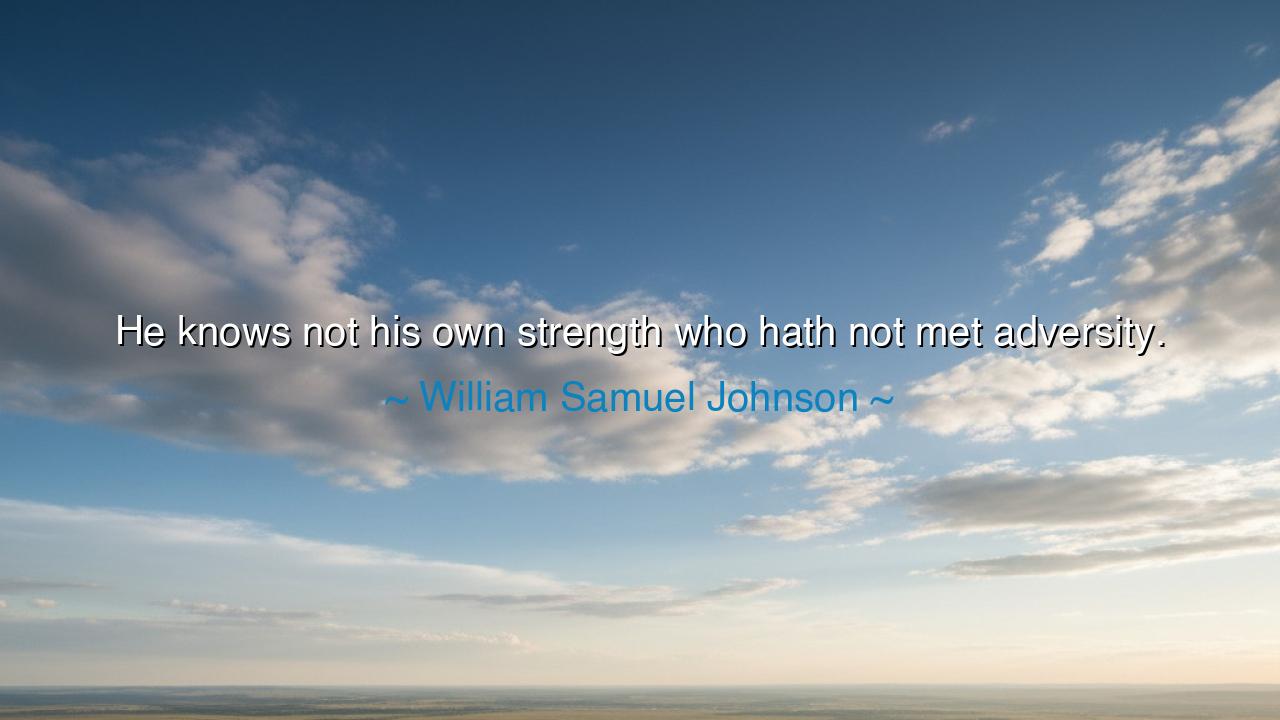
He knows not his own strength who hath not met adversity.






Hear the voice of the statesman and scholar, William Samuel Johnson, who declared: “He knows not his own strength who hath not met adversity.” These words are like iron struck upon the anvil of life, glowing with truth. They tell us that man’s true measure is not revealed in comfort, nor in ease, nor in the days when the sun shines bright. No—it is in the dark nights of trial, in the storms of hardship, in the furnace of suffering, that the hidden reserves of strength reveal themselves. Without adversity, a man walks blind to the depths of his own power.
The meaning is simple, yet profound. Adversity is the test, the mirror, the fire. It strips away illusion and shows us what lies beneath. Many believe themselves weak, yet when pressed by hardship, they rise, astonished by the endurance within them. Others believe themselves strong, but when trouble comes, their confidence crumbles like clay in the rain. Johnson’s wisdom tells us that strength cannot be known in theory; it must be proven, revealed only when fate sets its heavy hand upon us.
The ancients knew this truth well. Consider the tale of Hercules, born with divine strength but knowing little of it until his labors tested him. It was in slaying the Nemean lion, in cleansing the Augean stables, in wrestling with monsters that his might was revealed both to the world and to himself. Without those trials, Hercules would have remained a figure of potential only. With them, he became a legend. Thus, strength sleeps until adversity awakens it.
History too offers us a clear mirror. When Winston Churchill faced the onslaught of the Second World War, he was not yet the lion whose voice rallied a nation. He had been doubted, even cast aside, for years. Yet in the darkest hour of Britain, when bombs fell and invasion threatened, his strength emerged, both to his people and to himself. Adversity summoned forth his courage, and in that crucible he discovered the full measure of his power. His life bears witness to Johnson’s words: only in trial do we know ourselves.
But adversity is not only for heroes of history. Each soul must face its storms. The illness that tests the body, the betrayal that pierces the heart, the failure that humbles pride—these are the trials that reveal our hidden mettle. Many would curse adversity, but the wise embrace it as teacher. For the storm that seems to break us is also the storm that shows us that we do not break so easily. Strength unknown becomes strength revealed.
The lesson is clear: do not fear adversity, for it is the revealer of your true self. When hardship comes, do not say, “I cannot endure,” but rather, “Now I will discover what I am made of.” For without such moments, you will pass through life untested, never knowing the greatness within. As fire proves gold, so adversity proves the soul.
Practical action follows. When trials come, face them with steadiness rather than despair. Write down what you endure and what you overcome, so you may see your strength with your own eyes. Do not shield yourself—or those you love—from every hardship, for in doing so, you may rob them of the chance to know their own power. Instead, walk through adversity with courage, learn its lessons, and emerge stronger.
For remember this: he who hath not met adversity walks in shadow, unknowing of himself. But he who has endured trial, who has stood firm against the storm, knows that within him dwells a power greater than he dreamed. This is Johnson’s wisdom, passed to us across the ages: seek not to flee hardship, but to face it. For only in adversity will you meet your truest strength.






AAdministratorAdministrator
Welcome, honored guests. Please leave a comment, we will respond soon